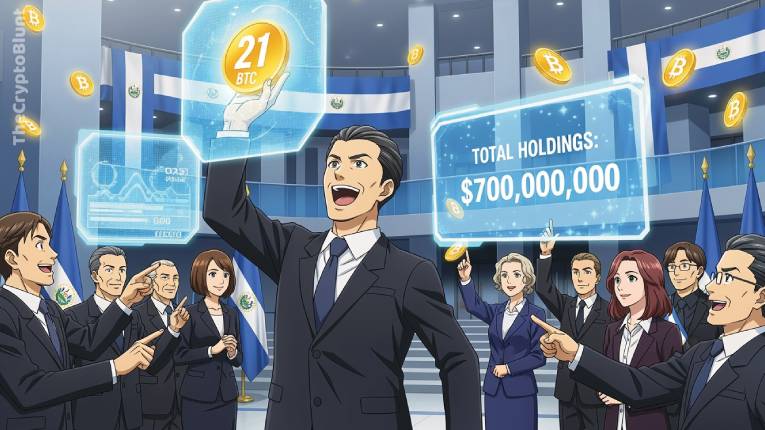The fourth anniversary of its Bitcoin Law was commemorated by El Salvador with the acquisition of 21 BTC, bringing the nation’s total holdings to a value of $701 million.
Bitcoin is still being accumulated by El Salvador.
On Sunday, President Nayib Bukele verified that 21 BTC had been purchased by the country’s Bitcoin Office to commemorate the fourth anniversary of the nation’s Bitcoin legal tender law.
A symbolic gesture toward Bitcoin’s 21 million-coin supply limit was made by the acquisition, which also continues the government’s reserve-building strategy despite strained relations with international lenders.
It is shown by data that since March of last year, El Salvador has continued to acquire 1 BTC on a daily basis.
Based on the government’s official data and blockchain records, a total of 6,313.18 BTC are now held by the country, with a value of approximately $701 million.
El Salvador Becomes First Nation to Adopt Bitcoin as Legal Tender in 2021
The Bitcoin Law of El Salvador was enacted in 2021, resulting in the nation becoming the globe’s first to embrace Bitcoin as legal tender alongside the U.S. dollar.
The measure was promoted at the time as a means of boosting financial access and lowering remittance fees, even though critics cautioned against volatility and macroeconomic risks and noted that the move ostensibly went against the “crypto ethos,” since the authority to implement it was granted by the state.
Although symbolic, El Salvador’s most recent acquisition complicates compliance with its $1.4 billion IMF loan agreement from December of last year, which requires that voluntary accumulation be halted by public entities.
It was stated by IMF officials at the time that the country had committed to halting acquisitions as part of the finalized Extended Fund Facility.
Under the terms of the agreement, El Salvador revised its Bitcoin Law so that merchant acceptance was made voluntary, though the cryptocurrency remains legal tender. The agreement also necessitates the dissolution of the Fidebitcoin trust and the government’s withdrawal from the Chivo wallet program.
Despite these mandates and ongoing revisions to its agreement with the IMF, Bitcoin has been consistently acquired by El Salvador. Future payments under the IMF program are contingent on compliance reviews through 2027, thus keeping the government under scrutiny.
The National Bitcoin Office redistributed its holdings across numerous addresses late last month, with a limit of approximately 500 BTC per wallet. Quantum computing threats were cited by officials as the justification for the alteration.
The new addresses were listed on a publicly accessible dashboard to promote transparency.
A March IMF report estimated El Salvador’s Bitcoin purchases since 2021 at roughly $300 million, yielding over $400 million in unrealized gains at present prices. The fund noted, however, that a full independent assessment of the portfolio is prevented by limited disclosure.
A place among the largest sovereign Bitcoin reserves is still held by El Salvador’s holdings, which surpasses nations experimenting with mining-supported strategies.
















